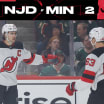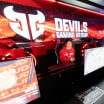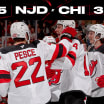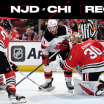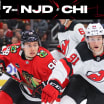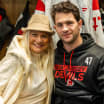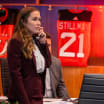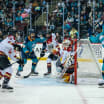Devils fans, are you ready for a big celebration and a kernel of compelling hockey history that goes with it.
For starters, we're hailing the 40th anniversary of one of the hockey world's most stirring events -- The Miracle On Ice.
That's an alias for Uncle Sam's fabulous underdog hockey team winning the Gold Medal at Lake Placid, and beating the heavily-favored Soviet sextet in the process.
The ultimate annexation of the Gold Medal was ultimately secured when coach Herb Brooks' stick handlers defeated Finland in the finale, 4-2.
Sports Illustratedcalled it "The Top Sports Moment Of The 20th Century." The International Ice Hockey Federation called it "The Best International Hockey Story In 100 Years."
SUNDAYS WITH STAN: How the Miracle on Ice Affected the Devils
Stan Fischler writes about the history of the Devils franchise in his weekly column
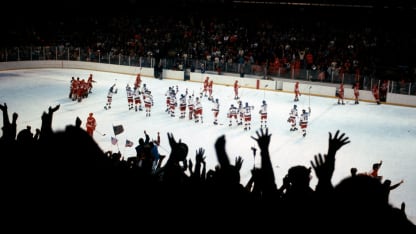
By
Stan Fischler
Special to NHL.com
While the spotlight once again will be focused on such heroic figures as captain Mike Eruzione, goalie Jim Craig and the other champions, it's worth noting that their impact transcended 1980.
Not only that, but Uncle Sam's considered-impossible hockey victory transcended time and geography. It spawned a hockey renaissance in New Jersey and -- in a roundabout way -- creation of the Devils.
It just was a matter of time and fortuitous circumstances that couldn't be better scripted by an army of Hollywood scriptwriters.
One thing was certain, kids throughout America -- and especially New Jersey -- became excited about hockey. New rinks were being built across the state and, as a result, local lads such as Jim Dowd eventually made it to The Show.
Dowd, who grew up in Brick Township, would eventually gain his epaulettesscoring a huge goal against the Red Wings en routeto the Devils first Stanley Cup.
"Winning the Gold was something that whetted my appetite to get into hockey," the Devils eventual owner Dr. John McMullen told me during a conversation we had on a rooftop Hoboken restaurant during the mid-1980s.
A World War II U.S.Navy hero, the patriotic McMullen had been deep into sports since his childhood days in Hoboken right up to his stint at the Naval Academy before getting aboard ship.
He adored baseball and played football for Montclair High School and once a successful businessman became a limited partner of the New York Yankees and owner of the Houston Astros.
"I loved all sports," said McMullen, "and when the '80 Olympics started I zeroed in on our hockey team. But who could have imagined how far they'd go."
Well, they went all the way but at that time, there was no National Hockey League team for Doc Mac to buy. The franchise that would become New Jersey's own was not exactly flourishing in Denver.
Nicknamed the Colorado Rockies, the franchise was buried in the NHL's subterranean depths when Team USA won its Gold Medal. Following the Olympics, the Rockies finish tied for last in the Smythe Division.
But the Gold Medal win also nourished the seek that already was planted for an NHL team at The Meadowlands. It happened this way:
By the time the Olympians had captured the title, New Jersey trucking executive Arthur Imperatore had spent a good deal of time. eyeing the new Meadowlands Arena as the home of the Rockies, which he had bought in 1978.
During the 1979-80 season, Imperatore turned hands-on operation of the Rockies to his step-son. Once the Gold Medal was annexed in Lake Placid, Imperatore was determined to capitalize on hockey in America more than ever.
Imperatore canvased the NHL Board of Governors and learned that he need the unanimous agreement of all 21 teams. At the time, neither the Rangers, Islanders or Flyers wanted a team in New Jersey,
Also inspired by the Herb Brooks and his Buddies was Robert E. Mulcahy, III, chief executive officer of the New Jersey Sports and Exposition Authority.
"With the huge spurt in hockey interest since Lake Placid we more than ever wanted to get a team," said Mulcahy.
Meanwhile, frustrated by the Rangers-Islanders opposition, Imperatore sold the Rockies franchise to Buffalo tv magnate Peter Gilbert who didn't take long to realize that his Denver franchise was failing.
Galvanized by Uncle Sam's triumph in 1980 and the groundswell of hockey mania, Dr. McMullen had been focused on the Rockies machinations and when he realized he could buy the franchise, the good Doc swung into action.
For starters, he employed the "Can Do" motto he learned as a Navy man. Then, he learned how he could get approval to move the team from Denver to East Rutherford.
The secret words were "transfer fee." Or as the whimsical McMullen put it, "The alternative was no team. It's like deciding what's better than not being alive. The alternative was terrible. There was no other way,"
In a sense, the 1980 Olympic victory -- by deductive reasoning -- let to the birth of the Devils.
Sort of like a baseball triple-play; from finding Gold in Upstate New York to Jersey-ite Imperatore wanting to put an NHL team in The Meadowlands to Doc McMullen actually doing it.
The owner of the Garden State's first major league team could not have imagined that six years after he signed his NHL deal two members of the Medal-winning team would be wearing Devils uniforms.
Forward Mark Johnson, a former star at the University of Wisconsin -- his father was Hall of Fame coach Bob Johnson -- and defenseman Jack O'Callahan were the chief protagonists, spurring the Devils to their first playoff berth.
That was accomplished on the final night of the 1987-88 season when Herb Brooks & Company brushed the hated Rangers aside to wiggle into the final playoff berth.
Brooks, himself, graced the Meadowlands for the 1992-93 season and while he didn't produce any miracles, Herb did capture the imagination of fans and media like, including Rich There of the Newark Star-Ledger.
Writing in the Star-Ledger's"25 -- The History of the Devils in New Jersey," Where remembered having breakfast with Brooks in a Pittsburgh hotel.
Chere: "Herb drew on napkins plays he had planned for that night's 1993 playoff game with the Penguins. It's impossible to a coach in any sport doing anything similar today."
Yet another Lake Placid hero also would extend his championship resume in The Meadowlands. On June 24, 1995 a crowd of 19,040 jammed the Meadowlands Arena for Game Four of the Stanley Cup Final.
With Jacques Lemaire behind the bench, the Devils led the heavily-favored Detroit Red Wings three games to nil. Another New Jersey victory would result in The Stanley Cup moving to the Garden State for the first time.
Incredible as it may seem, none other than a 1980 Olympic star reprised his hero role. That man was Neal Broten who in East Rutherford matched his amazing performance fifteen years ago in the little Adirondack town.
Broten, who arrived in New Jersey on February 27, 1995, via a trade with Dallas, took the ice with the teams tied 2-2.
The climactic play began when teammate Bill Guerin fed defenseman Scott Niedermayer who flew into the Detroit zone like a whirlwind. Scanning the horizon, Nieder spotted Broten uncovered in front of the goalie Mike Vernon.
Neal shot but Vernon made the save but gave a rebound. This time Broten used his right skate to control the rubber. Given a second chance the erstwhile Olympic ace moved the puck on his stick and fired it into the twine.
It was Neal's second goal of the game. The time was 7:56 of the second period, putting New Jersey ahead, 3-2. In due time it would be the biggest goal of Broten's lengthy career.
How could it not be since it was THE goal that proved to be the Cup-winner in New Jersey's eventual 5-2 triumph over Detroit!
Hail to the Miracle On Ice heroes and for what they accomplished for the game of hockey, for the development of the ice game in New Jersey and -- in the long run -- for helping the Devils win their first Stanley Cup!

